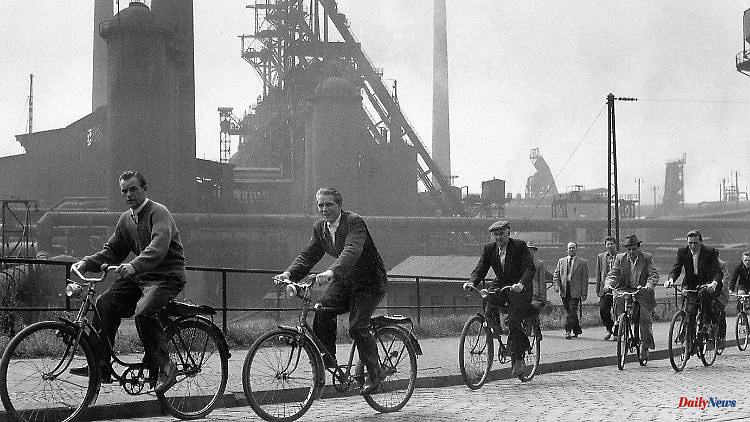The feeling of not being able to do the job anymore. Many people are familiar with the question of the meaning of work. Also Sara Weber, who finally quit and wrote a book about what needs to change in the working world.
Just a few months ago, many thought that Corona would completely change the way we work. Suddenly it was possible for many more people to work from home. Consideration was even given to children or relatives to be cared for. Professional groups that keep society running seemed to get recognition they had long been denied. With the perceived end of the pandemic, there is hardly anything left of it.
What has remained is a nagging unease as to whether the 40-hour week at a location specified by the employer and the race for even more sales should really still define gainful employment today. So did Sara Weber, who was editor-in-chief at the LinkedIn careers network. In 2021 she quit because it just wasn't working anymore. "Because I was burned out," she writes about this moment in her book "The world is ending, and I still have to work." Weber cries when she quits and at the same time wonders why there is no working world that focuses on humanity and justice.
"We are in this situation in which the crises are really increasing. But the world of work continues as if nothing had happened," Weber tells ntv.de. Up until a few years ago, burnout was still seen as an individual problem, which mainly affected people who were not organized well enough or who were too perfectionistic. In the meantime, many can no longer create a full-time job, although they actually need the money. It seems as if work eats up all of life, all joie de vivre, all social contacts, family life.
Germany certainly has very moderate working hours, but the promise of eight hours of work, eight hours of free time and eight hours of sleep has long since ceased to be fulfilled for many. "When women and mothers work part-time and then have another job on top of that, namely taking care of the household and children, then they still often work eleven hours a day. This is also the case with commuters or shift workers days longer." At the same time, many people have the feeling that they can no longer do their work in the given time. "The work has become so concentrated that you are almost always chasing."
Weber describes the unfavorable developments in today's working world: Working hours are too long, although technological developments could actually bring relief. The lack of recognition of work that makes gainful employment possible at all, not just care work in the family, but that of the service industry, which takes on what hardly anyone can do alongside a full-time job. This includes cleaners as well as kindergartens and restaurants. But it also shows the complex patterns of disadvantage that certain groups still face: women, the disabled, people of color.
On the other hand, the changes are unmistakable, human labor becomes more valuable in a time when there is a shortage of skilled workers. And the climate crisis is putting entire employment models to the test because they are either extremely harmful to the climate or jobs, for example, do not contribute to overcoming the crisis. In general, not only Weber is asking the question to what extent work can still fulfill the associated promises of success, prosperity and satisfaction. Pandemic, climate crisis and war together make your own health and lifetime much more valuable.
Therefore, one of their proposals for change is the collective reduction of working hours with full wage compensation. "In studies we see that this reduces stress, which is a really good thing because it has a negative impact on health. Productivity, on the other hand, often stays the same." But Weber also sees an opportunity to focus on core tasks instead of wasting time on bullshit jobs, as author David Graeber called them. "It keeps us using technology more wisely and also rethinks unnecessary tasks that we all feel just make us work more, not less."
The author sees another effect in human relationships. Studies have shown that men do more care work when both partners in heterosexual relationships work part-time. "You can see where you could really start and thus initiate processes and, in a second step, also achieve results that go beyond pure working hours."
If you follow Weber's arguments, the chances for change have not been as good for a long time. Many companies see that they can no longer find employees. "It will become even more acute that this competition among themselves will be fueled and companies will look for solutions to still get good people," believes Weber. Especially since not only Generation Z, but probably also the following generations "will no longer feel like working themselves to pieces".
Is Weber naive? Doesn't she see that in major German cities it is already almost impossible to pay for an apartment with a full-time income? Hasn't she followed the collective bargaining struggles of recent years? "We can't simply carry on as we have in the last few decades without changing anything," she answers these questions. The way of doing business must also change. "It's not about saying nobody should work anymore and nobody should make more sales. But the question arises as to who gets the money when a company makes sales." Currently, it mostly goes to shareholders, instead of money or time to the employees.
"We have to do business differently, we have to work differently and we also have to think differently about equality," emphasizes Weber. The 35-year-old already sees developments and changes. Much of what the digital strategy has now written down is not particularly new. Nevertheless, she manages to give the topic a new urgency and at the same time encourage workers to take a critical look at their respective employment relationships. In any case, a trend has been observed in the USA for some time, for which the term "The Great Resignation" has become common. Those who can leave working conditions that do not feel good because they are too boring or too strenuous or simply cannot be reconciled with everyday life.












